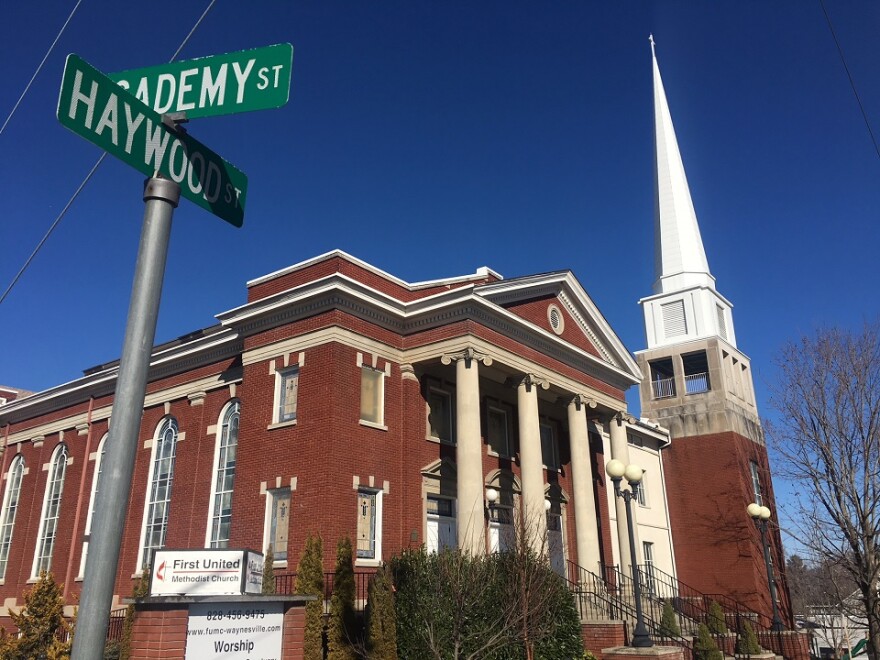Last week, sixteen different international United Methodist groups came together to announce a proposal for a split over LGBTQ rights. BPR talked to Methodist leaders in Western North Carolina about what this means for a region with deep ties to the church.
But at one church in Haywood County, this decision has already been made.
People are still finding their seats as the 8:40am service at Waynesville First United Methodist Church starts. The contemporary praise band starts kicks off the “Awakening Service.”
“Today is the day, the Lord has made! I will rejoice and be glad in it…”

It’s one of three services offered on Sunday. This range of traditional to contemporary marks the range of members at most Methodist churches.
“Good Morning and Happy New Year!”
That’s Reverend Keith Turman. He’s the Senior Pastor at First United.
“It’s the first Sunday of the year. A significant day,” explains Thurman.
Turman preaches on peace and reflection. He already knows where this church stands. Last summer, it voted to be “inclusive.” That means its welcoming to LGBTQ people and same-sex marriage, while also recognizing some members are still struggling with these beliefs. Turman says 90% of the church voted in favor of inclusive identity statements.
““I think that it was easy for us in that the outcome was clear. What if it had been 60/40? We would not have gone ahead with the identity statements then,” says Turman.
That sixty/forty split is where much of the rest of the region is says Smoky Mountain District Superintendent Linda Kelly. She heads the 68 UMC churches in the 8 westernmost counties of North Carolina. Kelly says the main point she wants local congregations to remember is that this is just a proposal. In the coming months, it will be made into legislation, which will then be voted on at the global General conference in May. She says that opinions in the rural district are diverse:
“We’re similar to all churches probably all over. There isn’t 100 percent agreement at any one church,” explains Kelly.
Hard conversations are going to be had in Methodist churches across the country for months, if not years to come. The proposal gives church conferences until July 2021 to make a decision, while allowing individual churches until 2024 to do the same.
It’s details like these that have brought the spectrum of Methodists groups in agreement.
“I just feel like this is the best that we can do. Because it removed the rancor and the litigation.”
That’s Talbot Davis. He’s pastor at Good Shepard Church, a “traditional” megachurch in Charlotte which is in the Western North Carolina Conference.
Davis is happy that the proposal allows the creation of a “traditional” denomination which believes in only heterosexual marriage. It’s important to him that each church will be able to keep all of its property. The proposal also says the new traditional division will get $25 million dollars over 4 years.
“It is kind of fair that this expression - that this perspective that is the official perspectives anyway - that we should get some seed money to continue,” says Davis. He’s been at Good Shepard since 1999 and says the church campus is valued around $14 million dollars.
Progressives also see the plan as a compromise. Helen Ryde is the southeastern regional organizer for Reconciling Ministries Network - which was part of the committee that wrote the protocol.
“I don’t think anyone thinks this is a perfect plan. Or that it really articulates justice for LGBTQ people but I do think that it provides a framework for the denomination to move forward,” says Ryde.
Ryde uses they/them pronouns and is queer. They were elected as a delegate to go to General Conference from Western North Carolina at the Lake Junaluska Annual Conference last summer. At WNC annual conference, all delegates voted in were progressive.
They believe this protocol will pass as Methodist law:
“I think we are going to see the larger denomination and the larger part of the church be able to create space in ways that it hasn’t been able to before and that gives me hope,” says Ryde.
The general conference vote takes place in Minneapolis in May.




